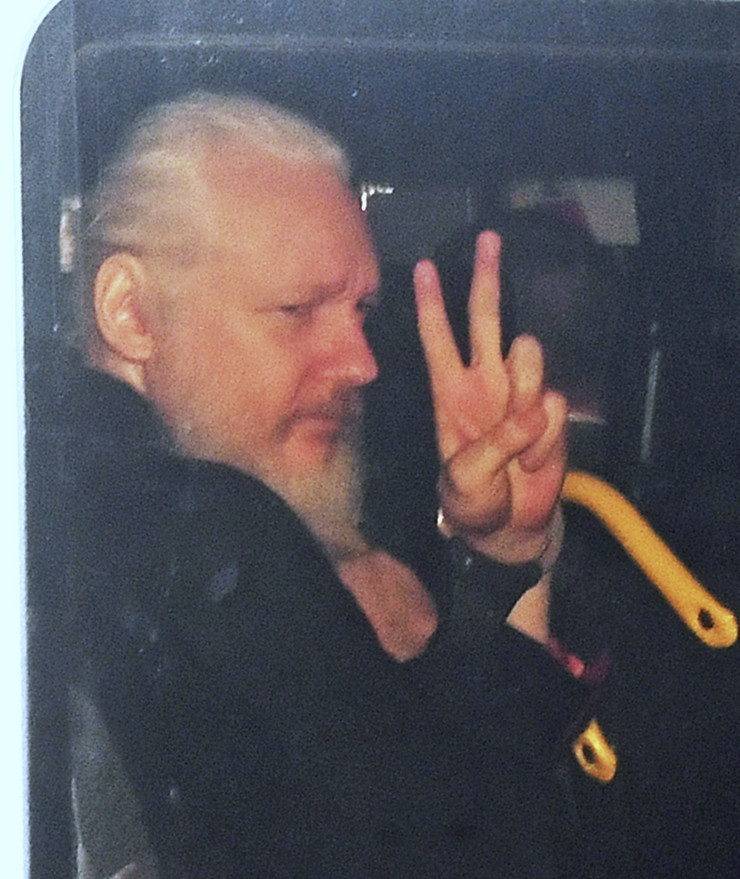WikiLeaks founder Julian Assange plans to fight a US extradition bid, his lawyer said, after his dramatic arrest on Thursday by British police ended a seven-year stay in the Ecuadorian embassy in London.
Assange, whose relationship with his hosts had become increasingly frayed, was dragged out of the embassy on Thursday morning after Quito revoked his asylum status and allowed British police to enter the building.
The Metropolitan Police said Assange was arrested for failing to surrender to an earlier warrant issued by a British court.
Police later said the 47-year-old Australian citizen and whistleblower website founder was “further arrested on behalf of the United States authorities.”
The US Justice Department announced it has charged Assange for conspiring with former US military intelligence analyst Chelsea Manning to leak a trove of classified material in 2010.
Manning was jailed for seven years for leaking documents, including State Department cables and military videos, to WikiLeaks to draw the public’s attention to the wars in Iraq and Afghanistan.
She was released in 2017 after former president Barack Obama commuted her original 35-year sentence, but she was detained last month for refusing to testify to a grand jury in a case involving WikiLeaks.
“The UK must resist! Resist this attempt by the Trump administration,” Assange shouted as he was escorted into a police van, according to a video posted by The Guardian and other media.
A judge at London’s Westminster Magistrates’ Court found Assange guilty later Thursday of failing to surrender to British authorities over a 2010 warrant linked to sexual assault charges in Sweden, which were later dropped.
Assange pleaded not guilty of skipping bail. The case was sent to a higher court for sentencing, while Assange is due to appear again in the magistrates’ court on May 2 for a hearing on the extradition request.
“We will be fighting extradition,” his lawyer, Jennifer Robinson told reporters outside the court after meeting Assange.
“This sets a dangerous precedent,” Robinson said of the extradition process.
Barry J. Pollack, a US attorney for Assange, said that “the factual allegations against Mr. Assange boil down to encouraging a source to provide him information and taking efforts to protect the identity of that source.”
“Journalists around the world should be deeply troubled by these unprecedented criminal charges,” his statement said.
The Swedish Prosecution Authority meanwhile said it would review a request to re-open the investigation into a rape allegation against Assange.
Ecuador terminated Assange’s asylum because he repeatedly violated international conventions, according to Ecuadorian President Lenin Moreno.
“Finally, two days ago, WikiLeaks, Mr. Assange’s allied organization, threatened the government of Ecuador,” he said in a video statement.
Quito on Thursday suspended the Ecuadorian citizenship it had granted to Assange.
His citizenship was suspended by the ministry on Wednesday “due to several irregularities found in its processing,” Foreign Minister Jose Valencia announced.
Later on Thursday, Ecuadorian Interior Minister Maria Paula Romo said a man linked to WikiLeaks had been arrested as he was attempting to leave on a flight to Japan.
“There is a destabilization plot in Ecuador that is linked to geopolitical interests,” Romo said.
“We have proof of a relationship between the person arrested and Ricardo Patino, who was foreign minister when Julian Assange was granted asylum,” she continued.
WikiLeaks alleged this week Assange was subjected to “an extensive spying operation” at the embassy. Cameras monitored “his every move,” including meetings with doctors and lawyers, the organization said.
Moreno said Ecuador had requested Britain to ensure that Assange would not be “extradited to a country where he could face torture or the death penalty.”
Assange had been holed up in the embassy since 2012, originally to avoid arrest and extradition to Sweden.
WikiLeaks tweeted that Ecuador had “illegally terminated Assange political asylum in violation of international law.”
But British Prime Minister Theresa May told parliament she welcomed the arrest, praising Ecuador for its help in “bringing this matter to a resolution.”
US President Donald Trump said on Thursday when asked about Assange’s arrest: “It’s not my thing … It’s not my deal in life. I don’t really have any opinion.”
He added that he had seen reports about the arrest of Assange in London, but that anything further on the Us side would be determined by the attorney general.
During the 2016 presidential campaign, Trump praised WikiLeaks multiple times. The website had controversially published hacked emails from the Democratic Party that were damaging to Hillary Clinton, his opponent.
Clinton on Thursday said that Assange “has to answer for what he has done.”
“It is clear from the indictment that came out … [the arrest] is about assisting the hacking of a military computer to steal information from the United States government,” Clinton told an audience in New York.
“I’ll wait and see what happens with the charges and how it proceeds, but he skipped bail in the UK, Sweden has those charges that have been dropped,” the former secretary of state said while at an event at the Beacon Theater with her husband, former president Bill Clinton.
“The bottom line is he has to answer for what he has done, at least as it has been charged.”
Assange is due to appear again in the magistrates’ court on May 2 for a hearing on the US extradition request.





Comments are closed for this post.